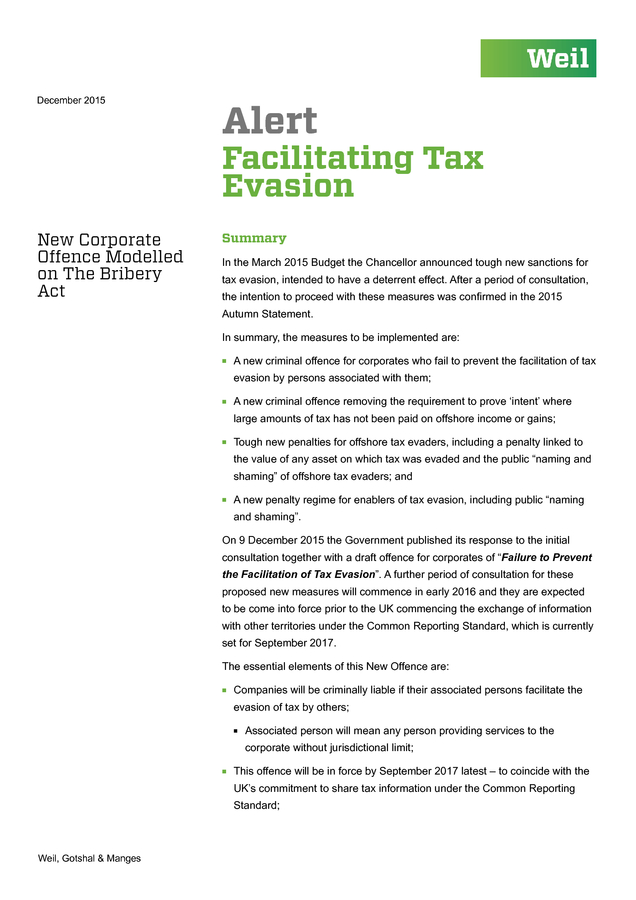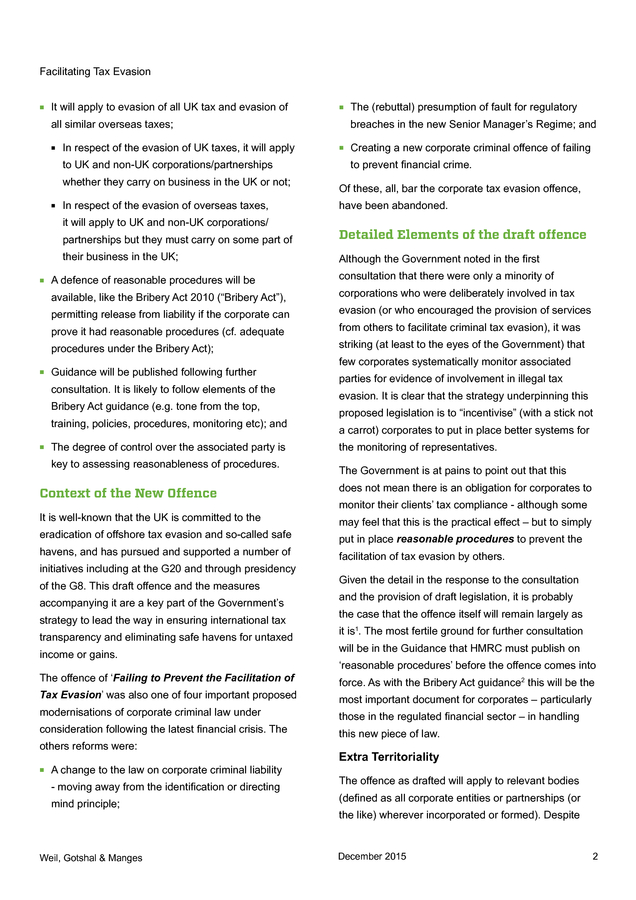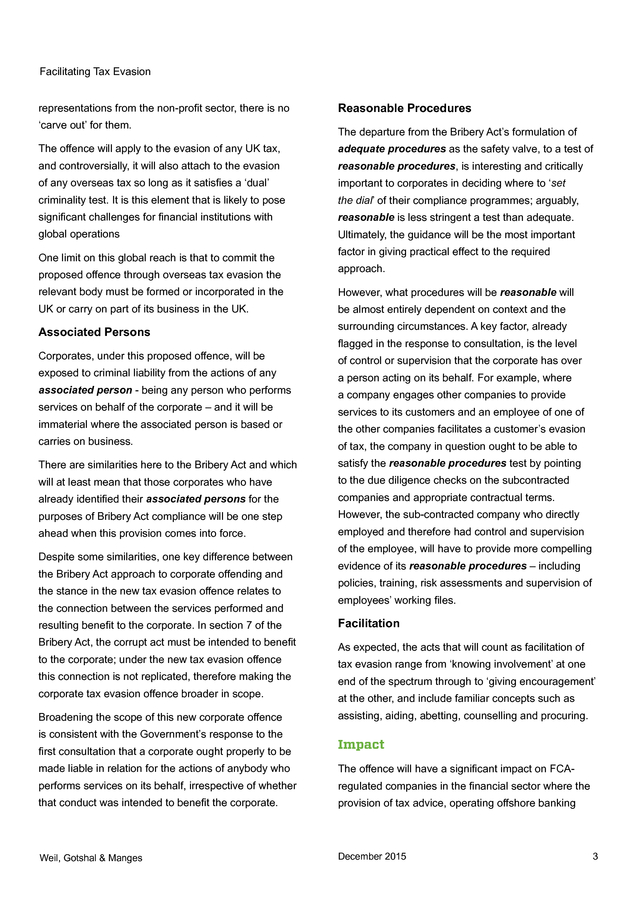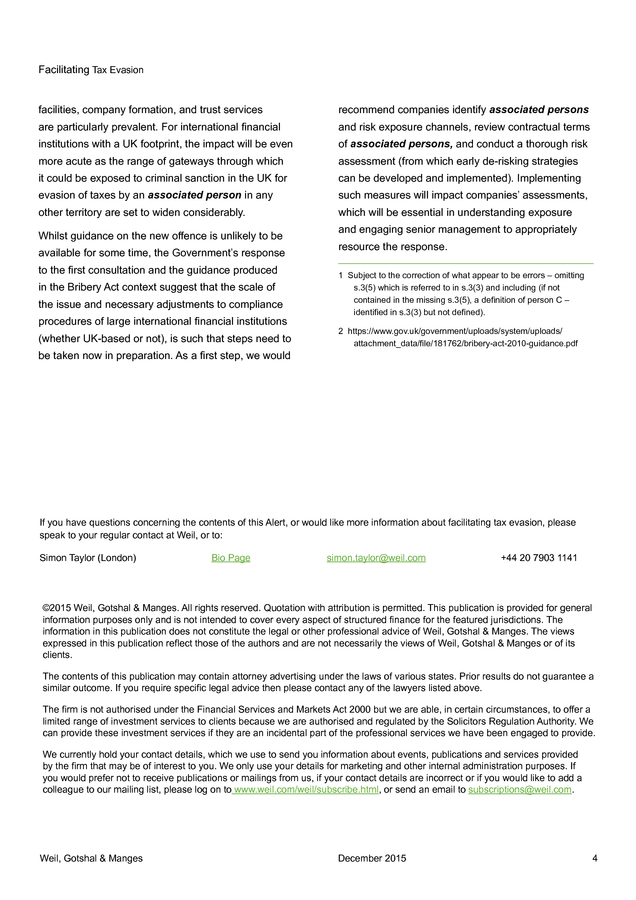Description
December 2015
Alert
Facilitating Tax
Evasion
New Corporate
Offence Modelled
on The Bribery
Act
Summary
In the March 2015 Budget the Chancellor announced tough new sanctions for
tax evasion, intended to have a deterrent effect. After a period of consultation,
the intention to proceed with these measures was confirmed in the 2015
Autumn Statement.
In summary, the measures to be implemented are:
„„
A new criminal offence for corporates who fail to prevent the facilitation of tax
evasion by persons associated with them;
„„
A new criminal offence removing the requirement to prove ‘intent’ where
large amounts of tax has not been paid on offshore income or gains;
„„
Tough new penalties for offshore tax evaders, including a penalty linked to
the value of any asset on which tax was evaded and the public “naming and
shaming” of offshore tax evaders; and
„„
A new penalty regime for enablers of tax evasion, including public “naming
and shaming”.
On 9 December 2015 the Government published its response to the initial
consultation together with a draft offence for corporates of “Failure to Prevent
the Facilitation of Tax Evasion”. A further period of consultation for these
proposed new measures will commence in early 2016 and they are expected
to be come into force prior to the UK commencing the exchange of information
with other territories under the Common Reporting Standard, which is currently
set for September 2017.
The essential elements of this New Offence are:
„„
Companies will be criminally liable if their associated persons facilitate the
evasion of tax by others;
„„
Associated person will mean any person providing services to the
corporate without jurisdictional limit;
„„
This offence will be in force by September 2017 latest – to coincide with the
UK’s commitment to share tax information under the Common Reporting
Standard;
Weil, Gotshal & Manges
. Facilitating Tax Evasion
„„
It will apply to evasion of all UK tax and evasion of
„„
all similar overseas taxes;
„„
In respect of the evasion of UK taxes, it will apply
to UK and non-UK corporations/partnerships
whether they carry on business in the UK or not;
„„
In respect of the evasion of overseas taxes,
it will apply to UK and non-UK corporations/
The (rebuttal) presumption of fault for regulatory
breaches in the new Senior Manager’s Regime; and
„„
Creating a new corporate criminal offence of failing
to prevent financial crime.
Of these, all, bar the corporate tax evasion offence,
have been abandoned.
partnerships but they must carry on some part of
their business in the UK;
„„
Detailed Elements of the draft offence
Although the Government noted in the first
A defence of reasonable procedures will be
available, like the Bribery Act 2010 (“Bribery Act”),
permitting release from liability if the corporate can
prove it had reasonable procedures (cf. adequate
procedures under the Bribery Act);
„„
Guidance will be published following further
consultation. It is likely to follow elements of the
Bribery Act guidance (e.g. tone from the top,
training, policies, procedures, monitoring etc); and
„„
The degree of control over the associated party is
key to assessing reasonableness of procedures.
consultation that there were only a minority of
corporations who were deliberately involved in tax
evasion (or who encouraged the provision of services
from others to facilitate criminal tax evasion), it was
striking (at least to the eyes of the Government) that
few corporates systematically monitor associated
parties for evidence of involvement in illegal tax
evasion.
It is clear that the strategy underpinning this proposed legislation is to “incentivise” (with a stick not a carrot) corporates to put in place better systems for the monitoring of representatives. The Government is at pains to point out that this Context of the New Offence does not mean there is an obligation for corporates to It is well-known that the UK is committed to the may feel that this is the practical effect – but to simply eradication of offshore tax evasion and so-called safe havens, and has pursued and supported a number of initiatives including at the G20 and through presidency of the G8. This draft offence and the measures accompanying it are a key part of the Government’s strategy to lead the way in ensuring international tax transparency and eliminating safe havens for untaxed income or gains. The offence of ‘Failing to Prevent the Facilitation of Tax Evasion’ was also one of four important proposed modernisations of corporate criminal law under consideration following the latest financial crisis. The others reforms were: „„ A change to the law on corporate criminal liability - moving away from the identification or directing mind principle; Weil, Gotshal & Manges monitor their clients’ tax compliance - although some put in place reasonable procedures to prevent the facilitation of tax evasion by others. Given the detail in the response to the consultation and the provision of draft legislation, it is probably the case that the offence itself will remain largely as it is1.
The most fertile ground for further consultation will be in the Guidance that HMRC must publish on ‘reasonable procedures’ before the offence comes into force. As with the Bribery Act guidance2 this will be the most important document for corporates – particularly those in the regulated financial sector – in handling this new piece of law. Extra Territoriality The offence as drafted will apply to relevant bodies (defined as all corporate entities or partnerships (or the like) wherever incorporated or formed). Despite December 2015 2 .
Facilitating Tax Evasion representations from the non-profit sector, there is no ‘carve out’ for them. Reasonable Procedures The departure from the Bribery Act’s formulation of The offence will apply to the evasion of any UK tax, adequate procedures as the safety valve, to a test of and controversially, it will also attach to the evasion reasonable procedures, is interesting and critically of any overseas tax so long as it satisfies a ‘dual’ important to corporates in deciding where to ‘set criminality test. It is this element that is likely to pose the dial’ of their compliance programmes; arguably, significant challenges for financial institutions with reasonable is less stringent a test than adequate. global operations Ultimately, the guidance will be the most important One limit on this global reach is that to commit the proposed offence through overseas tax evasion the factor in giving practical effect to the required approach. relevant body must be formed or incorporated in the However, what procedures will be reasonable will UK or carry on part of its business in the UK. be almost entirely dependent on context and the Associated Persons surrounding circumstances. A key factor, already Corporates, under this proposed offence, will be of control or supervision that the corporate has over exposed to criminal liability from the actions of any associated person - being any person who performs services on behalf of the corporate – and it will be immaterial where the associated person is based or carries on business. flagged in the response to consultation, is the level a person acting on its behalf. For example, where a company engages other companies to provide services to its customers and an employee of one of the other companies facilitates a customer’s evasion of tax, the company in question ought to be able to There are similarities here to the Bribery Act and which satisfy the reasonable procedures test by pointing will at least mean that those corporates who have to the due diligence checks on the subcontracted already identified their associated persons for the companies and appropriate contractual terms. purposes of Bribery Act compliance will be one step However, the sub-contracted company who directly ahead when this provision comes into force. employed and therefore had control and supervision Despite some similarities, one key difference between the Bribery Act approach to corporate offending and the stance in the new tax evasion offence relates to the connection between the services performed and of the employee, will have to provide more compelling evidence of its reasonable procedures – including policies, training, risk assessments and supervision of employees’ working files. resulting benefit to the corporate.
In section 7 of the Facilitation Bribery Act, the corrupt act must be intended to benefit As expected, the acts that will count as facilitation of to the corporate; under the new tax evasion offence this connection is not replicated, therefore making the corporate tax evasion offence broader in scope. Broadening the scope of this new corporate offence is consistent with the Government’s response to the tax evasion range from ‘knowing involvement’ at one end of the spectrum through to ‘giving encouragement’ at the other, and include familiar concepts such as assisting, aiding, abetting, counselling and procuring. first consultation that a corporate ought properly to be Impact made liable in relation for the actions of anybody who The offence will have a significant impact on FCA- performs services on its behalf, irrespective of whether regulated companies in the financial sector where the that conduct was intended to benefit the corporate. provision of tax advice, operating offshore banking Weil, Gotshal & Manges December 2015 3 . Facilitating Tax Evasion facilities, company formation, and trust services recommend companies identify associated persons are particularly prevalent. For international financial and risk exposure channels, review contractual terms institutions with a UK footprint, the impact will be even of associated persons, and conduct a thorough risk more acute as the range of gateways through which assessment (from which early de-risking strategies it could be exposed to criminal sanction in the UK for can be developed and implemented). Implementing evasion of taxes by an associated person in any such measures will impact companies’ assessments, other territory are set to widen considerably. which will be essential in understanding exposure Whilst guidance on the new offence is unlikely to be available for some time, the Government’s response to the first consultation and the guidance produced in the Bribery Act context suggest that the scale of the issue and necessary adjustments to compliance procedures of large international financial institutions (whether UK-based or not), is such that steps need to be taken now in preparation. As a first step, we would and engaging senior management to appropriately resource the response. 1 Subject to the correction of what appear to be errors – omitting s.3(5) which is referred to in s.3(3) and including (if not contained in the missing s.3(5), a definition of person C – identified in s.3(3) but not defined). 2 https://www.gov.uk/government/uploads/system/uploads/ attachment_data/file/181762/bribery-act-2010-guidance.pdf If you have questions concerning the contents of this Alert, or would like more information about facilitating tax evasion, please speak to your regular contact at Weil, or to: Simon Taylor (London) Bio Page simon.taylor@weil.com +44 20 7903 1141 ©2015 Weil, Gotshal & Manges.
All rights reserved. Quotation with attribution is permitted. This publication is provided for general information purposes only and is not intended to cover every aspect of structured finance for the featured jurisdictions.
The information in this publication does not constitute the legal or other professional advice of Weil, Gotshal & Manges. The views expressed in this publication reflect those of the authors and are not necessarily the views of Weil, Gotshal & Manges or of its clients. The contents of this publication may contain attorney advertising under the laws of various states. Prior results do not guarantee a similar outcome.
If you require specific legal advice then please contact any of the lawyers listed above. The firm is not authorised under the Financial Services and Markets Act 2000 but we are able, in certain circumstances, to offer a limited range of investment services to clients because we are authorised and regulated by the Solicitors Regulation Authority. We can provide these investment services if they are an incidental part of the professional services we have been engaged to provide. We currently hold your contact details, which we use to send you information about events, publications and services provided by the firm that may be of interest to you. We only use your details for marketing and other internal administration purposes.
If you would prefer not to receive publications or mailings from us, if your contact details are incorrect or if you would like to add a colleague to our mailing list, please log on to www.weil.com/weil/subscribe.html, or send an email to subscriptions@weil.com. Weil, Gotshal & Manges December 2015 4 .
It is clear that the strategy underpinning this proposed legislation is to “incentivise” (with a stick not a carrot) corporates to put in place better systems for the monitoring of representatives. The Government is at pains to point out that this Context of the New Offence does not mean there is an obligation for corporates to It is well-known that the UK is committed to the may feel that this is the practical effect – but to simply eradication of offshore tax evasion and so-called safe havens, and has pursued and supported a number of initiatives including at the G20 and through presidency of the G8. This draft offence and the measures accompanying it are a key part of the Government’s strategy to lead the way in ensuring international tax transparency and eliminating safe havens for untaxed income or gains. The offence of ‘Failing to Prevent the Facilitation of Tax Evasion’ was also one of four important proposed modernisations of corporate criminal law under consideration following the latest financial crisis. The others reforms were: „„ A change to the law on corporate criminal liability - moving away from the identification or directing mind principle; Weil, Gotshal & Manges monitor their clients’ tax compliance - although some put in place reasonable procedures to prevent the facilitation of tax evasion by others. Given the detail in the response to the consultation and the provision of draft legislation, it is probably the case that the offence itself will remain largely as it is1.
The most fertile ground for further consultation will be in the Guidance that HMRC must publish on ‘reasonable procedures’ before the offence comes into force. As with the Bribery Act guidance2 this will be the most important document for corporates – particularly those in the regulated financial sector – in handling this new piece of law. Extra Territoriality The offence as drafted will apply to relevant bodies (defined as all corporate entities or partnerships (or the like) wherever incorporated or formed). Despite December 2015 2 .
Facilitating Tax Evasion representations from the non-profit sector, there is no ‘carve out’ for them. Reasonable Procedures The departure from the Bribery Act’s formulation of The offence will apply to the evasion of any UK tax, adequate procedures as the safety valve, to a test of and controversially, it will also attach to the evasion reasonable procedures, is interesting and critically of any overseas tax so long as it satisfies a ‘dual’ important to corporates in deciding where to ‘set criminality test. It is this element that is likely to pose the dial’ of their compliance programmes; arguably, significant challenges for financial institutions with reasonable is less stringent a test than adequate. global operations Ultimately, the guidance will be the most important One limit on this global reach is that to commit the proposed offence through overseas tax evasion the factor in giving practical effect to the required approach. relevant body must be formed or incorporated in the However, what procedures will be reasonable will UK or carry on part of its business in the UK. be almost entirely dependent on context and the Associated Persons surrounding circumstances. A key factor, already Corporates, under this proposed offence, will be of control or supervision that the corporate has over exposed to criminal liability from the actions of any associated person - being any person who performs services on behalf of the corporate – and it will be immaterial where the associated person is based or carries on business. flagged in the response to consultation, is the level a person acting on its behalf. For example, where a company engages other companies to provide services to its customers and an employee of one of the other companies facilitates a customer’s evasion of tax, the company in question ought to be able to There are similarities here to the Bribery Act and which satisfy the reasonable procedures test by pointing will at least mean that those corporates who have to the due diligence checks on the subcontracted already identified their associated persons for the companies and appropriate contractual terms. purposes of Bribery Act compliance will be one step However, the sub-contracted company who directly ahead when this provision comes into force. employed and therefore had control and supervision Despite some similarities, one key difference between the Bribery Act approach to corporate offending and the stance in the new tax evasion offence relates to the connection between the services performed and of the employee, will have to provide more compelling evidence of its reasonable procedures – including policies, training, risk assessments and supervision of employees’ working files. resulting benefit to the corporate.
In section 7 of the Facilitation Bribery Act, the corrupt act must be intended to benefit As expected, the acts that will count as facilitation of to the corporate; under the new tax evasion offence this connection is not replicated, therefore making the corporate tax evasion offence broader in scope. Broadening the scope of this new corporate offence is consistent with the Government’s response to the tax evasion range from ‘knowing involvement’ at one end of the spectrum through to ‘giving encouragement’ at the other, and include familiar concepts such as assisting, aiding, abetting, counselling and procuring. first consultation that a corporate ought properly to be Impact made liable in relation for the actions of anybody who The offence will have a significant impact on FCA- performs services on its behalf, irrespective of whether regulated companies in the financial sector where the that conduct was intended to benefit the corporate. provision of tax advice, operating offshore banking Weil, Gotshal & Manges December 2015 3 . Facilitating Tax Evasion facilities, company formation, and trust services recommend companies identify associated persons are particularly prevalent. For international financial and risk exposure channels, review contractual terms institutions with a UK footprint, the impact will be even of associated persons, and conduct a thorough risk more acute as the range of gateways through which assessment (from which early de-risking strategies it could be exposed to criminal sanction in the UK for can be developed and implemented). Implementing evasion of taxes by an associated person in any such measures will impact companies’ assessments, other territory are set to widen considerably. which will be essential in understanding exposure Whilst guidance on the new offence is unlikely to be available for some time, the Government’s response to the first consultation and the guidance produced in the Bribery Act context suggest that the scale of the issue and necessary adjustments to compliance procedures of large international financial institutions (whether UK-based or not), is such that steps need to be taken now in preparation. As a first step, we would and engaging senior management to appropriately resource the response. 1 Subject to the correction of what appear to be errors – omitting s.3(5) which is referred to in s.3(3) and including (if not contained in the missing s.3(5), a definition of person C – identified in s.3(3) but not defined). 2 https://www.gov.uk/government/uploads/system/uploads/ attachment_data/file/181762/bribery-act-2010-guidance.pdf If you have questions concerning the contents of this Alert, or would like more information about facilitating tax evasion, please speak to your regular contact at Weil, or to: Simon Taylor (London) Bio Page simon.taylor@weil.com +44 20 7903 1141 ©2015 Weil, Gotshal & Manges.
All rights reserved. Quotation with attribution is permitted. This publication is provided for general information purposes only and is not intended to cover every aspect of structured finance for the featured jurisdictions.
The information in this publication does not constitute the legal or other professional advice of Weil, Gotshal & Manges. The views expressed in this publication reflect those of the authors and are not necessarily the views of Weil, Gotshal & Manges or of its clients. The contents of this publication may contain attorney advertising under the laws of various states. Prior results do not guarantee a similar outcome.
If you require specific legal advice then please contact any of the lawyers listed above. The firm is not authorised under the Financial Services and Markets Act 2000 but we are able, in certain circumstances, to offer a limited range of investment services to clients because we are authorised and regulated by the Solicitors Regulation Authority. We can provide these investment services if they are an incidental part of the professional services we have been engaged to provide. We currently hold your contact details, which we use to send you information about events, publications and services provided by the firm that may be of interest to you. We only use your details for marketing and other internal administration purposes.
If you would prefer not to receive publications or mailings from us, if your contact details are incorrect or if you would like to add a colleague to our mailing list, please log on to www.weil.com/weil/subscribe.html, or send an email to subscriptions@weil.com. Weil, Gotshal & Manges December 2015 4 .

















